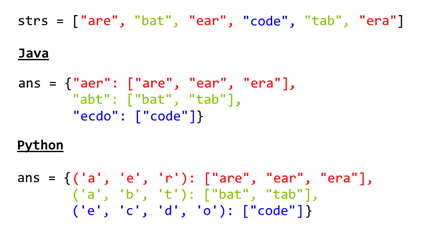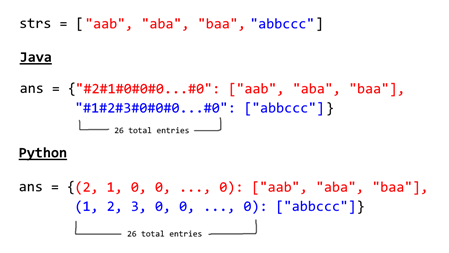Leetcode 49.字母异位词分组
字母异位词分组
给定一个字符串数组,将字母异位词组合在一起。字母异位词指字母相同,但排列不同的字符串。
示例:
输入: ["eat", "tea", "tan", "ate", "nat", "bat"],
输出:
[
["ate","eat","tea"],
["nat","tan"],
["bat"]
]
说明:
- 所有输入均为小写字母。
- 不考虑答案输出的顺序。
方法一:排序数组分类
思路
当且仅当它们的排序字符串相等时,两个字符串是字母异位词。
算法
维护一个映射 ans : {String -> List},其中每个键 K\text{K}K 是一个排序字符串,每个值是初始输入的字符串列表,排序后等于 K\text{K}K。
在 Java 中,我们将键存储为字符串,例如,code。 在 Python 中,我们将键存储为散列化元组,例如,('c', 'o', 'd', 'e')。

1 class Solution { 2 public List<List<String>> groupAnagrams(String[] strs) { 3 if (strs.length == 0) return new ArrayList(); 4 Map<String, List> ans = new HashMap<String, List>(); 5 for (String s : strs) { 6 char[] ca = s.toCharArray(); 7 Arrays.sort(ca); 8 String key = String.valueOf(ca); 9 if (!ans.containsKey(key)) ans.put(key, new ArrayList()); 10 ans.get(key).add(s); 11 } 12 return new ArrayList(ans.values()); 13 } 14 }

方法二:按计数分类
思路
当且仅当它们的字符计数(每个字符的出现次数)相同时,两个字符串是字母异位词。
算法
我们可以将每个字符串 s\text{s}s 转换为字符数 count\text{count}count,由26个非负整数组成,表示 a\text{a}a,b\text{b}b,c\text{c}c 的数量等。我们使用这些计数作为哈希映射的基础。
在 Java 中,我们的字符数 count 的散列化表示将是一个用 **#** 字符分隔的字符串。 例如,abbccc 将表示为 #1#2#3#0#0#0 ...#0,其中总共有26个条目。 在 python 中,表示将是一个计数的元组。 例如,abbccc 将表示为 (1,2,3,0,0,...,0),其中总共有 26 个条目。

1 class Solution { 2 public List<List<String>> groupAnagrams(String[] strs) { 3 if (strs.length == 0) return new ArrayList(); 4 Map<String, List> ans = new HashMap<String, List>(); 5 int[] count = new int[26]; 6 for (String s : strs) { 7 Arrays.fill(count, 0); 8 for (char c : s.toCharArray()) count[c - 'a']++; 9 10 StringBuilder sb = new StringBuilder(""); 11 for (int i = 0; i < 26; i++) { 12 sb.append('#'); 13 sb.append(count[i]); 14 } 15 String key = sb.toString(); 16 if (!ans.containsKey(key)) ans.put(key, new ArrayList()); 17 ans.get(key).add(s); 18 } 19 return new ArrayList(ans.values()); 20 } 21 }



